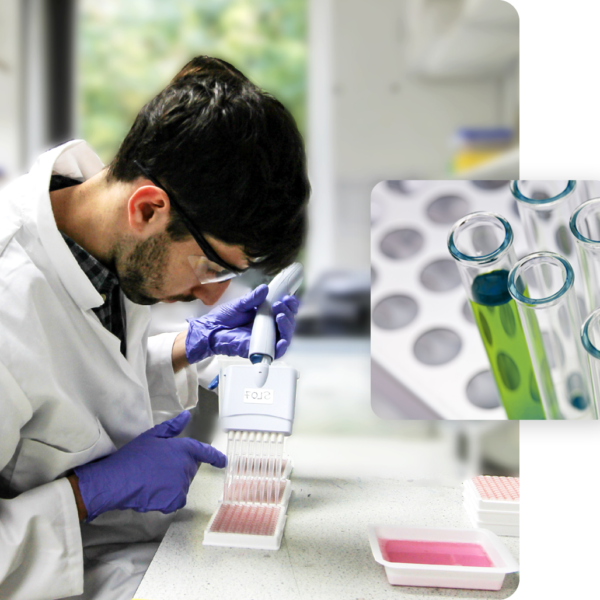Visiting your GP

Low and behold, just like investing in a new phone, car or TV, there’s plenty of options out there, but how do you know which ones are worth your money?
Before you set out on your quest towards a healthier lifestyle, there’s a few things you ought to know before you hit the checkout option on just any food intolerance test website.
First thing’s first. You may not want to waste your GP’s time, but it’s important you always book in with your registered doctor before you take a food intolerance test. Common symptoms of a food intolerance† can mimic more serious health conditions, so it’s important to us that you get checked out first.
Once they rule out anything serious, you can get rid of that niggling worry at the back of your mind that there could be something underlying and you can turn your attention to what you’re eating.
What’s the purpose of this guide?

Here at YorkTest, we’re the UK’s leading provider in food intolerance testing† and we’ve recently been named Food Intolerance Testing Company of The Year 2019. Due to our heritage and expertise, we therefore believe we’re in an authoritative position to express our views and be the first to address the food intolerance market in this simple buyers’ guide.
It’s often challenging to recognise the difference between food intolerance tests based on good science and those that have no basis in science. Because of this, the reputation of food intolerance tests has suffered, as the ones which are robust and reproducible have been tarred with the same brush as those which have no science behind them.
This buyers’ guide will help you make an informed decision based on quality, support, care and value. It also gives you useful tips on how you can swerve those dodgy providers and how to differentiate between a testing company which only have an interest in lining their back pocket, to others who will work around the clock, committed to your health and wellbeing.
Grab a cuppa! These are the most asked questions about food intolerance
Are food intolerance tests reliable?
The reliability of food intolerance tests widely varies across the market. You’ll find low priced tests on discount websites such as Groupon, or paid advertisements when you search ‘food intolerance tests’. However, the quality and benefits associated with each provider are often misleading and many have no scientific basis at all. Reliability is like opening a can of worms in the food intolerance world.
Your health shouldn’t be put in the hands of the inexperienced. That’s why we want to provide you with all the information you need to know, including tips on what to look out for from a testing provider.
What types of food intolerance tests are there?
Do a quick internet search for ‘food intolerance tests’ and you’ll be surprised how many companies are offering this service. They all have different prices; they all offer different benefits, but they all have one thing in common: to sell you a test to try to make you feel better. It makes you wonder how do you find that hidden gem? It’s like trying to find a needle in a haystack.
So what type of food intolerance tests are out there and what do they mean?
Tests that claim to provide information about which foods to avoid and which are suitable to eat can be grouped into these categories:
- Bioresonance food intolerance testing, including hair analysis and VEGA testing
- Pulse tests
- “Live” blood testing
- IgG blood tests
Are the answers in your hair and skin?
Bio-resonance is a fancy word for using electromagnetic frequencies to detect food intolerances. The reality is far from fancy, though.
Hair analysis – a lock of hair is sent to a laboratory and the energy fields in the hair are scanned to ‘determine’ food intolerances. The companies claim to fix everything under the sun and propose that the energy signals can pinpoint what is putting stress on your immune system.
Hair analysis is complete pseudoscience. Therefore, it’s safe to say this method is, quite simply, quackery!
VEGA tests – Also known as an electrodermal test, this claims to measure the body’s energy levels. The patient holds an electrode in one hand and the practitioner then uses a probe on the foot or other hand. If a trigger food is detected, there will be a dip in the electromagnetic conductivity.
This method is no better than chance, sorry to say!
Are the answers in your heart?
Pulse tests – You may have also heard of pulse tests as a method for detecting a food intolerance. The pulse is taken before eating a suspect food and measured 15 minutes after consumption. An increase in heartrate claims to indicate food intolerance. Again, this holds no basis in science and there is no correlation between heart rate and food intolerance.
Are the answers in your blood?
“Live” blood testing – This is where blood is mixed with the suspected food. It is then monitored to see if the white blood cells ‘change’ under the microscope. If they do change, this ‘indicates’ a problem food. This is an unproven method and holds no scientific basis.
IgG blood tests – This blood test looks at the IgG antibodies in blood. An increase in the levels of IgG can indicate an intolerance to a specific ingredient. There’s a large, and growing, body of scientific evidence that supports giving people choices about what they eat based on the results of a food specific IgG blood test.
The main tests you’ll find online are hair tests and IgG blood tests. Even then it’s a maze to work out which hair and IgG providers could give you the answers you’re hoping for, or whether some will leave you at a dead end. This buyers’ guide will give you all the answers.
What is hair testing and is it accurate?
Let’s talk hair testing. There are numerous companies out there which now use hair testing as a way to discover your trigger foods. They request that a small piece of hair is sent off to a ‘laboratory’ and scanned to determine ‘intolerances’. This is usually posted at your own cost and requires numerous hair strands as a sample.
 Food for thought: How can the energy fields of dead hair test for food intolerances?
Food for thought: How can the energy fields of dead hair test for food intolerances?
The answer is simple: it definitely cannot – save your lovely lock of hair. The companies that claim to deliver results for food intolerance from a hair sample simply have no validity. There are no ifs, buts or maybes when it comes to hair testing. Put simply, there are absolutely no markers of food intolerance present in, or emitted from, hair.
There are a number of these providers advertising online who make false claims and have no basis at all in science. Whenever you’re searching on Google next time, you can keep your eyes open for the ones named below:
- Bionetics
- Global Testing Lab
- Ident Allergy
- Intolerance Lab
- Test your Intolerance
- TMI testing
What’s the difference between hair and blood testing?
IgG antibodies are only present in the blood and cannot be identified from a hair sample. A hair testing provider usually asks for multiple hair strands and is ‘scanned’ to determine food intolerances. Not only is hair analysis complete quackery but results from these hair tests can lead to many foods being eliminated from the diet unnecessarily.
An IgG blood test, on the other hand, is carried out via a full blood draw or a simple finger-prick blood test, such as the ones offered by us here at yorktest. IgG blood testing is a robust method for detecting
Don’t quit while you’re ahead, though!
Some IgG blood tests aren’t quite what they seem, so it’s important you find the most suitable one through this buyers’ guide.
We’ll be mentioning factors such as:
- Independent research
- Nutritional support
- Heritage and expertise
Are all food intolerance blood tests the same?
Sadly not. To start with, there are a few food intolerance providers out there which only test for one type of your IgG rather than all 4, such as Lifelab testing and CeraScreen. Taking one of these tests severely limits the accuracy of pinpointing those ingredients that are causing reactions which, in turn, could be contributing to your symptoms.
People looking for a food intolerance test will naturally skip the scientific IgG jargon on a website, especially when this is explained in an over-complicated manner. To get the most of your test, it’s important you opt for one which analyses the whole of your IgG profile, not just a small percentage.
Are food intolerance tests worth it?
We don’t want to be a party pooper, but not all food intolerance tests are worth it, and as the UK’s leading provider in food intolerance testing and Food Intolerance Company of the Year 2018, it’s important for us to address this so people don’t get caught out.
Hair analysis, VEGA tests, “live” blood analysis, and pulse tests are pseudoscience. One effective method is through IgG testing which analyses the IgG reactions to the proteins in foods. In itself, this should be relatively straight forward. However, there are some providers which test for only one of the four types of food-specific IgG, giving you an unreliable insight into your food intolerances. It’s not as confusing as it sounds.
Why are your tests expensive?
This is a question we’re commonly asked, especially as we don’t feature heavy promos or discounts onsite.
The way we see it, throughout our 35 years’ experience, quality pays off. It’s similar to buying a car. Imagine that you’ve seen a car that has taken your interest, but it has no Satnav, it has high mileage and the dealer isn’t reputable. It’s relatively inexpensive, but there’s uncertainty to how long you will see the benefits of having a car, or whether it’ll fail you straight after you’ve driven it off the forecourt. When that happens, you have no safety net in terms of guarantee and support to fall back on.
There’s another car you’ve seen which you’re also interested in. It has a Satnav, so you have extra guidance in terms of driving from A to B. The price is more expensive than the first, but it has a reliable track history, positive dealership reviews and after sale support in place should you need it.

Food for thought: You wouldn’t take a gamble on buying a car, so why would you take a gamble on a food intolerance test which has no basis in science, offers no aftercare and has no substantial studies behind it?
What to look for in a food intolerance test?

You may think every test is the same, right? Well, it couldn’t be further from the truth.
The food intolerance market has little, if any, regulation, which means that the average Joe could set up shop and say they specialise in food intolerance testing. In the questions above, we have discredited some types of food intolerance tests, such as hair testing, which measures the energy signals in dead hair. These types of tests are a waste of your energy, time and money.
The world of food intolerance tests can often leave you wondering which one to invest in. So, we’ve lifted the blindfold and rounded up 6 buyers’ tips to help you receive the best care and value, along with important factors you should consider when making your choice.
Buyers Guide
The Facts

- There’s an array of food intolerance tests out there available at your fingertips, but the majority have no basis in science, such as hair testing, VEGA tests, “Live” blood testing, and pulse methods, so don’t waste your time on these tests
- Dubious tests on the markets have given food intolerance tests a bad name. The silver lining, however, is that there’s a shiny needle amongst the haystack
- Evidence is growing to support an IgG-guided elimination diet which empowers and gives people choices about what they eat
- Hold your horses, though! Not every IgG blood test is the same. Some providers only test one type of IgG, such as Lifelab Testing and CeraScreen, which doesn’t give you the full picture
- Check out a provider’s website for important indicators, such as experience, research, aftercare support and if their laboratory is in-house, not outsourced
- Your health and wellbeing is your priority, so find a provider who shares this belief
When it comes to your health and your wallet, you want peace of mind that the food intolerance test you’ve chosen actually serves its purpose: to make you feel better. You don’t want to worry about where your sample is being processed or how you’re going to act on your results without any advice or support.



 Food for thought: How can the energy fields of dead hair test for food intolerances?
Food for thought: How can the energy fields of dead hair test for food intolerances?